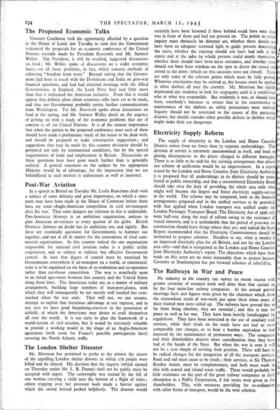Post-War Aviation
In a speech at Bristol on Tuesday Mr. Leslie Runciman dealt with a subject of some delicacy and great importance, on which a state- ment may have been made in the House of Commons before these lines are read—Anglo-American competition in civil air-transport after the war. That some dangers are inherent in this is undeniable. Pan-American Airways is an ambitious organisation, anxious to plan American air-services to every quarter of the globe. British Overseas Airways no doubt has its ambitions too, and rightly. But these are essentially questions for Governments to hammer out together, and not at all fit matter for the contentions of rival com- mercial organisations. In this country indeed the one organisation responsible for external civil aviation today is a public utility corporation, and so subject to indirect but effective Government control. At least that degree of control must be exercised by Governments everywhere if air-transport on a world, or continental, scale is to be organised on the basis of co-ordination and co-operation rather than cut-throat competition. The way is manifestly open to an initial agreement between this country and the United States along those lines. The Americans today are, as a matter of military arrangement, building large numbers of transport-planes, with which they will consequently be not merely well stocked but over- stocked when the war ends. They will not, we can assume, attempt to exploit that fortuitous advantage at our expense, and in any case we have good bargaining-counters in the possession of airfield; of which the Americans may desire to avail themselves all over the world. It is too early to plan the, framework of a world-system of civil aviation, but it would be extremely valuable to provide a working model in the shape of an Anglo-American agreement (with room for France's possible participation later) covering the North Atlantic traffic.


























 Previous page
Previous page